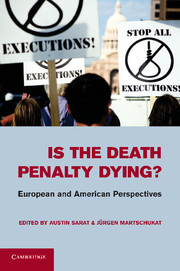Book contents
- Frontmatter
- Contents
- Contributors
- Acknowledgments
- Introduction: Transatlantic Perspectives on Capital Punishment
- PART I WHAT IS A PENALTY OF DEATH: CAPITAL PUNISHMENT IN CONTEXT
- Part II ON THE MEANING OF DEATH AND PAIN IN EUROPE AND THE UNITED STATES: VIEWING, WITNESSING, UNDERSTANDING
- 4 The Witnessing of Judgment
- 5 Unframing the Death Penalty
- 6 Executions and the Debate over Abolition in France and the United States
- Part III ABOLITIONIST DISCOURSES, ABOLITIONIST STRATEGIES, ABOLITIONIST DILEMMAS: TRANSATLANTIC PERSPECTIVES
- Index
4 - The Witnessing of Judgment
Between Error, Mercy, and Vindictiveness
Published online by Cambridge University Press: 04 February 2011
- Frontmatter
- Contents
- Contributors
- Acknowledgments
- Introduction: Transatlantic Perspectives on Capital Punishment
- PART I WHAT IS A PENALTY OF DEATH: CAPITAL PUNISHMENT IN CONTEXT
- Part II ON THE MEANING OF DEATH AND PAIN IN EUROPE AND THE UNITED STATES: VIEWING, WITNESSING, UNDERSTANDING
- 4 The Witnessing of Judgment
- 5 Unframing the Death Penalty
- 6 Executions and the Debate over Abolition in France and the United States
- Part III ABOLITIONIST DISCOURSES, ABOLITIONIST STRATEGIES, ABOLITIONIST DILEMMAS: TRANSATLANTIC PERSPECTIVES
- Index
Summary
The global production, exchange, and consumption of images of punishment have created a new landscape for penal sensibilities that our preoccupation with local and national legal orders needs to embrace as a cultural as well as a comparative project. This landscape posits new challenges for the scope of comparative reflection on the death penalty. It is a volatile landscape where the narcissism of small differences and legal cultures seems to prevail, and where it is no longer – if it ever was – possible to understand local penal sensibilities toward the death penalty without a comparative perspective. The fates of the death penalty are to borrow Robertson's apt but rather ungainly term ‘glocal’ – imagined globally and acted locally. This chapter explores one key aspect of this glocalization of the cultural lives of capital punishment – the global witnessing and local meanings of the act of judgment of death.
This chapter explores the cultural lives of act(s) of judgment in liberal democracies at a time of global witnessing. My interest follows on from earlier work that examined the Benetton death penalty advertising campaign and European campaigns to end the death penalty as instances of these global exchanges. This chapter's focus on judgment draws inspiration from Culbert's discussion of the problem of judgment in capital punishment. Her contribution explores the problem of judgment in the Supreme Court's language in the process of limiting and defending the practice.
- Type
- Chapter
- Information
- Is the Death Penalty Dying?European and American Perspectives, pp. 109 - 125Publisher: Cambridge University PressPrint publication year: 2011
- 1
- Cited by



